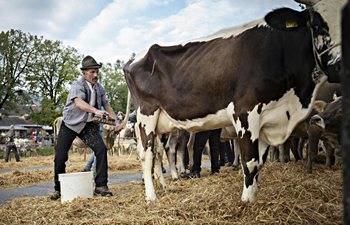HEFEI, Oct. 3 (Xinhua) -- At age four, Ji Tingqiao could remember the names of all the bones on a skeleton. In primary school, he could understand heavy ancient Chinese classics. At 15, this September, he started university.
Across China, gifted students over the past 40 years have been enrolled in a special program set up in the University of Science and Technology of China (USTC).
In 1978, the university initiated a program called the "Special Class for the Gifted Young," or the "Junior Class," offering young prodigies the opportunity to skip a few years of high school and get an early start in college.
So far, 1,589 students have graduated from the class. Many later became professors and scientists in top universities like Stanford and Harvard, as well as business leaders such as Ya-Qin Zhang, president of tech giant Baidu.
Despite the successes, the model has had its controversies. Ning Bo, a star student in the first junior class in 1978, became a university lecturer at 19, but later lashed out against the "prodigy education" on state television.
Society has been skeptical about whether such programs would cultivate top talent or nerds who could not fit into daily life.
Universities across the country that once flocked to set up similar programs shut down their classes, unable to satisfy students and failing to attend to their psychological development.
Yet after four decades, the USTC program has endured. The philosophy behind it has shifted to the overall development of students and tapping into their individual potential.
"Our selection does not focus simply on the young age or talent in a certain aspect. Candidates need to pay attention to overall qualities," said Chen Yang, the dean of the school of gifted young in USTC.
The school has abandoned criteria such as IQ tests and embraced a more comprehensive evaluation, combining scores on the national college entrance examination, writing tests, psychological tests and interviews.
"The objective of this school is not to select or train a prodigy. It is more like a place that offers education to potential students who are passionate about science and technology," Chen said.
The school offers a variety of extra-curricular activities for the gifted young.
"I have a busy life on campus," said Zhu Yuanhao, a senior student at the school. At the age of 19, he is preparing for his graduation.
Majoring in geophysics, Zhu spends a large amount of time studying. However, he has never left behind his hobbies of poetry, guitar and the game of Go.
"I sometimes play Minecraft in my spare time", said Zhu, who is also a member of the university's volunteer association.
"There are more than 70 societies in the university, and many are led by students in the school," said Lan Rong, deputy Party head of the school of gifted young.
Most of the students celebrate their 18th birthday after being enrolled, so the school holds a special ceremony each year to mark their move into adulthood.
"The ceremony is meaningful as it helps raise their consciousness of responsibilities in all aspects of life," Lan said.
"You will find students like Ji normal in our classes. It pushes others to study harder," Zhu said at a freshman reception meeting. "However, everyone knows studying is not the only part of the life here."
Soon to graduate, Zhu needs to decide on his future.
"Whatever I choose afterwards for my life, I will be always grateful for what the school has taught me," he said.

















